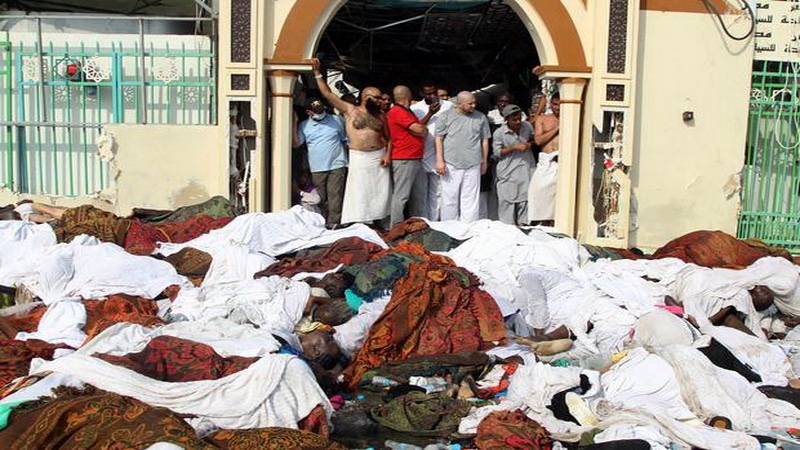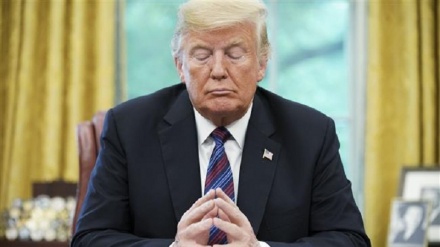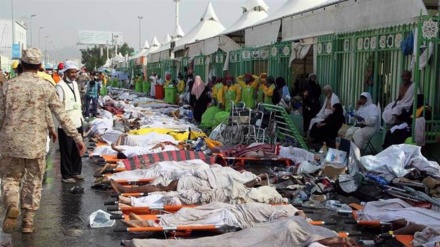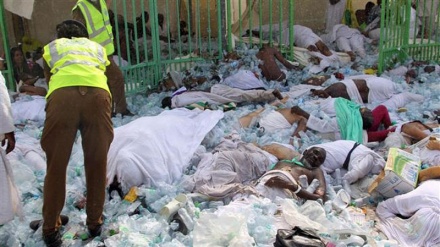Mena Tragedy (6)
Welcome to the 6th part of our 8-part series on last year’s tragedy at Mena in holy Mecca during the Hajj pilgrimage that led to the martyrdom of over 2,000 pilgrims to the symbolic house of God, the holy Ka’ba, including some 500 Iranians, because of the criminal negligence of law and order by the Wahhabi regime of Saudi Arabia, which this year has violated the tenets of Islam by barring pilgrims from Iran from performing the religious obligation of Hajj.
Today we continue yesterday’s eyewitness account of the tragedy of Mena last year, according to Iranian pilgrim, Mohammad, who says: As a result of heat, lack of water, and overcrowding, the pilgrims were actually compressed in the narrow passage of street number 204 in which the Saudis had herded us like flocks of sheep and then closed the exit points leading towards the Jamaraat. Many started to lose consciousness and then to the horror of each other, some collapsed and died. All this was happening before the eyes of the heartless Saudi security forces watching from their elevated positions and unmoved by the impending tragedy. We were falling upon each other, and many were being trampled in the confusion. I now started to recite the Shahadatayn or the two-fold testimony of faith, saying “ash-hado an la ilaha il-Allah, wa ash-hado anna Mohammadan Rasoul-Allah” meaning “I testify there is no god except Allah, and Mohammad is the Prophet of Allah.” I was now prepared for death, and started recollecting the faces of my father, mother, wife and children. I prayed to God to make them forgive me for my faults and bless me. They had no idea what was befalling me and the rest of the pilgrims at Mena. My only hope was that God Almighty accepts my uncompleted Hajj and punish the perpetrators of this crime. It seems I lost consciousness.
Amidst these moments of disappointment, consciousness returned to me, and I opened my eyes to see some pilgrims coming towards our group lying helplessly on the ground compressed by each other. A little hope was created in my heart. They quickly pulled the pilgrims who were alive out of the masses of bodies lying on the ground. I raised my hand to indicate I was alive, and miraculously a hand pull me out. With the first breath that I took I tried to embrace the man who helped me, but he had no time since he had to rescue many others. I sat in a corner. There was no sign of any Saudi relief worker or ambulance. At this moment, a pilgrim rushed towards me with a glass of water. It was indeed the elixir of life in that scorching weather and the near death I had faced. I quenched my thirst. It seemed as if it was most fresh water I ever had in all of my life. I suddenly remembered the thirst of Imam Husain (AS), and how the grandson of the Prophet of Islam, along with his companions and family members, including the 6-month old baby Ali Asghar, had been deprived for three days of this elixir of life, and then brutally martyred. I sent my salutation upon the Martyr of Karbala, as tears rolled down my eyes in visualizing history’s most-heartrending tragedy at the hands of the heartless Yazidi hordes, who masqueraded as Muslims. Here in Mena, the heartless Saudis were similar to the accursed Yazidis. Like those who never had any compassion for the Prophet’s family, these Wahhabis did not show the least pity towards the pilgrims. In fact, like Shimr and Ibn Sa’d, the defence minister and deputy heir apparent, Mohammad bin Salman, was seen smiling at the dead and dying pilgrims piled upon each other, as his automobile, along with armed escorts speeded by. Now we understood, we were subjected to such a ghastly tragedy in the narrow passage of street number 204, so that this tyrannical Saudi official and his entourage would use the other passages freely to drive towards Jamaraat for stoning the symbolic Satan. My God aren’t the Saudis devils in human form.
Gradually relief workers of other countries arrived. Their endeavors were really laudable. Finally, more than two hours after the Mena tragedy, some Saudi relief workers arrived, but whatever first aid they provided was not sufficient. At this moment, the Saudi police came with batons and rifles. They started shouting at the relief workers and ordered them to leave the place, so that they can do whatever they want with the injured and the bodies of the dead. I quickly limped away from the scene, helped by those who were leaving the place. When I felt better, I slowly moved towards the Iranian encampment and joined my hajj caravan. My fellow pilgrims rejoiced on seeing me. They had given up for dead. They asked whether I had seen the other missing colleagues. I had no information, and was indeed lucky to come out alive. Some 50 members of our caravans were victims of the horrible stampede. Some had lost their wives, some their husbands, some their sons, and some their brothers and sisters. There was loud wailing all around. We couldn’t do anything. The Saudi savages had quickly cleared the whole area where the stamped had occurred by dumping the dead and the injured in airtight container trucks and whisking them away from the site of the tragedy, so as to show that nothing had happened. As a result many more died. Among the victims of the Mena tragedy, two names were more familiar for the public. One was Iran's former ambassador to Lebanon Ghazanfar Roknabadi whom the Saudis used to hate, and the other was the prominent Iranian reciter of the holy Qur’an, Mohsen Haji Hassani whose moving recitation a day before at Arafaat, still echoes in my ears. We were all at the mercy of the Wahhabi brutes, but thanks to the decisive stance of the Leader of the Islamic Revolution, Ayatollah Seyyed Ali Khamenei, the rest of pilgrims returned home safely, amidst sorrow and grief.
AS/MG



